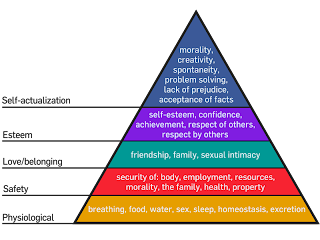This is the third article of a sequal about how business and managers responded on the financial crisis of 2008. In the first article I wrote about Frederic Taylor – the father of lean management – and his believes on how employers and employees should work together to get to the stage of excellence.
In the second article I wrote about when and how we became interested in all people, about the great motivational theories and made a link towards decisions taken during the crisis.
In this third article I will make the link towards motivation today. Before I do so, I will make the distinction between intrinsic and extrinsic motivation.
Intrinsic motivation
When I talk to managers and ask them how they try to motivate people, they always come up with extrinsic motivators like salary, company car, smart phone, bigger office, better chair, personal parking place, … Off course this is a rather difficult and expensive motivator. And before your give them to en employee, think twice, because maybe one day your employee one day becomes de-motivated, and then it is really difficult to take these extrinsic motivators away. The only “flexible” extrinsic motivator is bonus.
If you look beyond all those extrinsic motivators, you go to an individual level and there you find intrinsic motivation. The same employee who is eager to get a raise because he believes he’s not paid enough, might be a passionate club member of a football team. He is so passionate about it that he spends all of his weekends organizing events, cleaning up club-houses, selling tickets or travelling across the country, just to be with the team. And what does he earns at the football club ? Zero, nada, nothing at all ! But why is he doing it ? Because he gets recognition of the other club members, because he is passionate about the team, because he believes he’s doing the right thing. And that my friend is the unlimited energy source of intrinsic motivation.
Watch out, intrinsic motivation can also become negative, if the club starts abusing his willingness or doesn’t appreciate him anymore and the “free super member” becomes de-motivated and drops the team.
A good definition of intrinsic motivation can be : “the pleasure one gets from the task itself or from the sense of satisfaction in clompleting or even working on the task”. (like me, why am I speding hours writing on my blog ? J )
One of the most interesting theories that deals with intrinsic and extrinsic motivation is the Self Determination Theory (SDT) by Ryan & Deci. In this theory the authors argue how autonomy, competence and relatedness foster the most valuable and high quality forms of motivation and engagement for activities, including enhanced performance, persistence and creativity. They even go further and say that if any of these three elements is unsupported or ignored, it will have a big impact on the wellness and motivation of that person.
Research shows that :
· More than 50% of all employees doesn't get any recognition at work.
· 38% lacks autonomy
· 33% of all employees who suffer stress, has intentions to leave the company sooner or later.
· In 2010 we counted 9.139.770 absenteeism days due to stress and demotivation
What can we learn from this ?
In my previous blog-news I wrote how many managers behaved like a X-manager during the 2008 financial crisis. The believes of the X-manager (people should be controlled, they are lazy and stupid, …) are completely opposite to what is described in SDT as basis for further growth, creativity and motivation.
Although those manager believed they would survive the crisis by putting high pressure on employees, they in fact attacked people’s intrinsic motivators and through that, they had a negative impact on further growth and creativity of the organisation.
Even in times of crisis, employers should respect the autonomy, relatedness and further development of their employees. If they don’t, the waste the most valuable resource they have in had (as was mentioned by Frederic Taylor).
What’s next ?
In my next blog-post I continue with more facts and figures about the impact of demotivation. In the 5th blog post I will give you my advise how you can prepare yourself for the next crisis and properly react when it breaks out.

